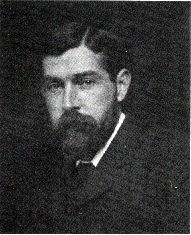Francis Herbert Bradley
Francis Herbert Bradley (born January 30, 1846 in Clapham , † September 18, 1924 in Oxford ) was an English philosopher and an important exponent of British idealism .
Life
He was born in Clapham, Surrey , England to Charles Bradley, an evangelical minister, and his second wife, Emma Linton. From 1865 to 1869 he studied at the University College of Oxford University in England. He tried to overcome the division between ethics , history , logic , epistemology , metaphysics and psychology . After several unsuccessful attempts to embark on an academic career, he was finally a non-teaching fellow at Merton College , Oxford. He was to hold this position until the end of his life. In 1923 he was elected a member of the British Academy .
Teaching
Bradley is u. a. known by the fact that for the first time in the history of philosophy he asked the question "Why should I be moral?" in the text Why should I be moral? (In: Ethical Studies. The Clarendon Press, 1876 Oxford.). In the 20th century, the text resolved a philosophical debate about the title question , which has continued to this day, and which has repeatedly been the title of books and book chapters in this context.
The Bradley quote "Where everything is bad it must be good to know the worst" comes first in Part II of Theodor W. Adorno's Minima Moralia .
Bradley's main work is the essay Appearance and Reality (1893). This writing served as the basis for Bradley's students Bertrand Russell and Alfred North Whitehead to take a critical look at the Hegelianism represented by Bradley . Whitehead in particular recognized Bradley's influence despite his fundamentally different solution in process and reality . “Although I stand in sharp contradiction to Bradley in the main part of the work, the difference in the end is not that big. [...] His insistence on 'feelings' coincides exactly with his own conclusions. [...] If one believes that the cosmology formulated here makes sense, one naturally asks oneself whether the mode of thinking that determines it has not arisen from the transfer of some of the main theses of absolute idealism onto a realistic basis. which is based on an ontological monism , which means that all real things can only be grasped as a unit. Access to the real world is immediate and can only be experienced through feeling. One can only speak of objects, facts or events by separating the unity that is grasped in feeling in thinking. Thought creates a “machine of concepts and relations.” (AR, 28) However, direct experience does not allow a true representation of reality. The fundamental terms for understanding the world such as substance, causality, relation or quantity each contain two contradictory, but equally true judgments. This led Bradley to a fundamental epistemological skepticism .
Works
- Single issues
- Appearance and Reality (1893) (German "appearance and reality" (1928))
- "Principles of Logic" (1883)
- Why should I be moral? In: Ethical Studies. The Clarendon Press, 1876 Oxford.
- Work edition
- Collected Works . Thoemmes, Bristol 1999, ISBN 1-85506-577-0 (reprint of London 1876 edition)
- A pluralistic approach to philosophy. 1865-1882 .
- A focus on metaphysics and psychology. 1883-1902 .
- Refinement and revision. 1903-1924 .
- Selected correspondence. June 1872 - December 1904 .
- Selected correspondence. January 1905 - June 1924 .
- Ethical studies .
- The principles of logic, vol. 1 .
- The principles of logic, vol. 2 .
- Appearance and reality .
- Essays on truth and reality .
- Collected essays, vol. 1 .
- Collected essays, vol. 2 .
literature
- Rolf-Peter Horstmann: Ontology and Relations. Hegel , Bradley, Russell and the Internal and External Relationship Controversy . Athenaeum, Königstein 1984, ISBN 3-7610-8366-1 .
- Claudia Moser : The problem of knowledge and reality with Francis Herbert Bradley and Bernard Bosanquet . At the same time dissertation at the University of Mainz 1986. Königshausen a. Neumann, Würzburg 1989, ISBN 3-88479-420-5 .
Web links
- Literature by and about Francis Herbert Bradley in the catalog of the German National Library
- Stewart Candlish: Entry in Edward N. Zalta (Ed.): Stanford Encyclopedia of Philosophy .
Individual evidence
- ↑ The small encyclopedia , Encyclios-Verlag, Zurich, 1950, volume 1, page 221
- ^ Deceased Fellows. British Academy, accessed May 8, 2020 .
- ^ Alfred North Whitehead: Process and Reality, Suhrkamp, Frankfurt 1984, 24
- ↑ According to Schischkoff, Philosophical Dictionary , 22nd edition (1991), ISBN 3-520-01322-3 / Bradley "the greatest original achievement of English metaphysics"
| personal data | |
|---|---|
| SURNAME | Bradley, Francis Herbert |
| BRIEF DESCRIPTION | English philosopher |
| DATE OF BIRTH | January 30, 1846 |
| PLACE OF BIRTH | Clapham |
| DATE OF DEATH | September 18, 1924 |
| Place of death | Oxford |
